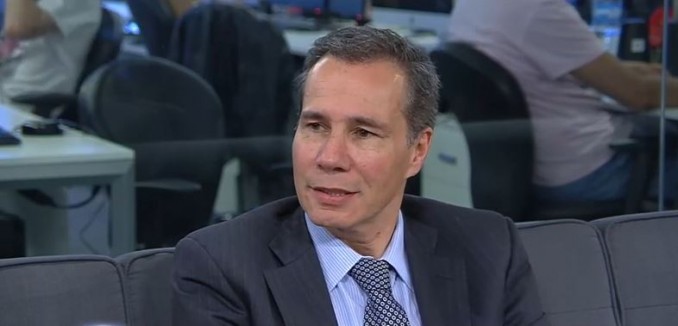Alberto Nisman, the Argentine prosecutor who accused President Cristina Fernandez de Kirchner on Wednesday of covering up Iran’s role in the 1994 bombing of the AMIA building, was found dead in his apartment yesterday – hours before he was due to present his findings to a closed-door session of Congress.
Using phone taps as evidence, Nisman had accused the Argentine government of arranging a grain-for-oil deal to help fill Argentina’s $7 billion annual energy gap. In return, he alleged, the government would drop the ongoing investigation of Iran over the bombing of the AMIA Jewish community center, which killed 85 people and was the single deadliest anti-Semitic attack since the Holocaust.
Argentina’s Ministry of National Security released a statement (Spanish link) this morning, stating that Nisman’s lifeless body was found on the floor of his bathroom in his apartment (which was locked from the inside), with a .22 caliber pistol and one empty shell casing lying nearby. Argentine Security Secretary Sergio Berni said that “all signs point to suicide,” though Nisman had forcefully stated his case on TV in the days prior and had promised an interview with The Guardian for tomorrow.
Christopher Dickey, foreign editor for The Daily Beast, has raised the possibility that Nisman was murdered by Iran, noting that Iran has a history of assassinating opposition figures and others who might harm their regime:
Between 1987 and 1993, according a French government memo published in a very detailed study called Le Hezbollah Global, between 1987 and 1993 some 18 opponents of the Tehran regime were murdered in Europe, and the CIA estimated that between 1989 and 1996 the Hezbollah network carried out 200 serious attacks costing hundreds of lives.
By the late 1990s, the Iranian government apparently decided to slow these operations after several of them started to bring down too much heat. The Germans conducted a relentless investigation of the murder of Kurdish leaders in Berlin in 1992, tracing them back to the then-head of Iranian intelligence, Ali Fallahian. The AMIA bombing in 1994 caused international outrage. And the bombing of the Khobar Towers apartments in Saudi Arabia in 1995, which killed 19 Americans, was eventually traced to another group of Iranian acolytes.
This past November, agents of Hezbollah, the terrorist organization funded by Iran, were arrested in Peru for plotting attacks against Jewish targets. That same month, reports emerged that the government of Brazil believed that Hezbollah had been smuggling arms into the South American country at least since 2006. A 2013 State Department report cataloged Iran’s efforts to expand its terror network across South America.
Argentine opposition leader Patricia Bullrich told Agence France-Presse that Nisman’s death was “a grave affront to the country’s institutions.” She noted that she had spoken to Nisman on the phone three times on Saturday, and that he had told her that he had received several threats. The opposition newspaper Clarin reported that a few days ago, Nisman had told the paper, “I could end up dead because of this.”
In Has Argentina Turned Against its Jews?, published in the October 2014 issue of The Tower Magazine, Eamonn MacDonagh chronicled Nisman’s 2006 investigation that formally named high-level Iranian officials as suspects in the AMIA bombing, and the efforts by the Argentine government to avoid bringing Iran to justice for its deadly attack:
[Nisman accused] top officials in the Iranian government and military establishment, such as Ahmad Vahidi, Iran’s Defense Minister at the time and a former senior commander of the Iranian Revolutionary Guard Corps; Imad Mughniyeh, who had been behind countless Iranian-backed terror attacks, including the 1983 Beirut bombings, and was considered the number-two in Hezbollah behind Hassan Nasrallah before his assassination in Damascus in 2008; Ali Fallahian, who served as Iran’s intelligence minister from 1989 to 1997; and Mohsen Rabbani, believed by many to be the architect and chief coordinator of what they see as Iran’s vast terror network across Latin America. The effort to extradite these men has been a long one, and has now descended into what can only be called a ritual; one that has become an established part of the Argentine political calendar.…
But in her remarks to the United Nations General Assembly on September 24 of this year, President Cristina Fernández de Kirchner of Argentina made a decisive change in the ritual: She took the liberty of very publicly criticizing the representatives of the Argentine Jewish community for opposing a failed pact with Iran that would have set up a joint investigation into the massacre with the Islamic Republic.
To grasp the full nature of both the pact in question and just how outrageous was her criticism of Argentina’s Jews for their opposition to it, readers may wish to imagine the United States setting up a joint commission with the Taliban to investigate the 9/11 attacks, with the entire investigation to be carried out under Taliban supervision in Kabul. Add this to the long history of Argentinian obfuscation—including the indictment of Carlos Menem, who was president at the time of the AMIA attack, on charges of obstructing the investigation—and one can understand why anyone with a sense of decency, much less the actual community that had been targeted, would be infuriated at such a deal….
It seems that, twenty years after it occurred, the AMIA massacre is and will remain an unsolved crime, while the president of Argentina sees fit to wonder in public whether the Jewish community might all along have been looking, not for justice, but to single-handedly start a war with Iran.
How Argentina reached such a nadir is a long story, but it is worth telling; if only as an object lesson in what not to do when confronting Iranian terrorism. It is also, unfortunately, a depressing tale of just how difficult it is to obtain justice for victims of terrorism when those victims happen to be Jews.
[Photo: Infobae / YouTube]




